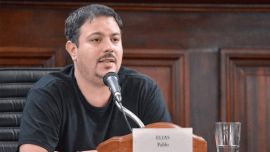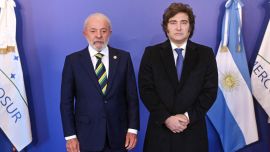Martín Guzmán’s bid to dump Energy Undersecretary Federico Basualdo at the close of April, frustrated for now despite counting on the support of President Alberto Fernández, has reignited rumours over the economy minister’s immediate future.
The speculation has also damaged the wider government, exposing infighting within Frente de Todos. Guzmán, a star minister, ran into considerable “friendly fire” from factions within Argentina’s ruling coalition, especially from La Cámpora militant grouping and the Instituto Patria think tank, both of which respond to Vice-President Cristina Fernández de Kirchner.
While government sources believe it likely that Basualdo will be eased into some other post in the next few days, they also admit that the clash will leave behind some very open wounds – it is impossible for an undersecretary to resist a minister without the latter losing face. Meanwhile overseas markets are taking note of the strain.
“Guzmán’s role had been devalued” and “everything indicates that this fight does not end here,” said one member of the government’s economic team, speaking on condition of anonymity.
The minister’s entourage also admits that the accelerated erosion is starting to wear out the minister, who has already hinted twice at resignation in recent times.
Guzmán, who successfully restructured more than US$65 billion in foreign debt but has been stalled in his attempts to secure a new financing programme with the International Monetary Fund, has already been pushed to his limits. He had already been wrong-footed last September when capital controls were carried to extreme limits, just two days after he said there would be no more restrictions on money markets.
Rumour mill
This latest bout of turmoil came to head in the last hours of April. Last Friday, hours after President Fernández had announced the new restrictions against the second wave of Covid-19, Guzmán requested the resignation of Basualdo. The third-line official had failed to design segmented increases according to income groups, thus reducing subsidies.
News of the request was leaked by Casa Rosada sources to local outlets, although the authority of the source was later disputed. The minister was said to have been strongly supported by both President Fernández and Cabinet chief Santiago Cafiero in standing up to government hardliners – including Energy Undersecretary Basualdo – who were opposing any increases in utility rates.
Instituto Patria and other Kirchnerite hardliners dug in their heels against any increase beyond single digits, reasoning that it would otherwise be impossible to win this year’s midterm elections. Already on Friday evening, spokespeople of Cristina Fernández de Kirchner Kirchner (who had apparently not been consulted about Guzmán’s exit) started telling journalists off the record that the request for Basualdo’s resignation "never existed" and it was all "a press invention."
The pushback was aggressive. Soon, rumours started circulating that it was Guzmán who would be resigning, not Basualdo.
Without being able to reduce the massive subsidies for energy consumption and with the costs of fighting Covid-19 mounting amid rising poverty, Guzmán saw his bid to trim the fiscal deficit and hence inflation slipping out of control.
Compromise
On May Day an uneasy compromise was reached. Both a weakened Guzmán and Basualdo would be staying put, but only if the latter’s ENRE regulatory agency formalised an increase (without specifying that it would be the “only” increase this year, as desired by Kirchnerism).
Yet the continuing lag of utility pricing behind inflation not only spells trouble for the fiscal deficit, via higher subsidies, it also complicates foreign debt negotiations, especially with the International Monetary Fund (IMF), whom hardliners insist cannot be repaid in anything less than 20 years.
Any agreement with the IMF has been effectively rolled over until after the elections and now hardliners want to do the same with utility billing.
In recent meetings of the Economic Cabinet, Guzmán stressed that in the first quarter of this year, Argentina had registered the lowest fiscal deficit in the last five years, largely by virtue of rescheduling debt payments to private creditors.
Such arguments do not wash with Fernández de Kirchner, according to sources. The former president considers that in times of pandemic more state handouts are needed, without regard for the deficit.
Advance of Kicillof
Many of Guzmán’s problems also stem from the advance of Buenos Aires Province Governor Axel Kicillof (himself a former Economy minister), as demonstrated in the hyperactive role of Domestic Trade Secretary Paula Español (a foreign trade undersecretary in Kiciloff’s former economic team and a disciple of his) in terms of price controls.
On Monday Kicillof weighed in, saying "Federico Basualdo is an excellent official," and adding that "keeping [utility] increases in single digits is important" in an interview with the El Destape radio programme Habrá Consecuencias ("There will be Consequences"). But at the same time the governor attributed the alleged infighting to newspaper rumours.
During the interview, the governor was harshly critical of the electricity bill increases of"close to 3,000 percent in some cases" under the previous Mauricio Macri presidency, saying that this had only served for extraordinary profits, foreign debt and capital flight without improving the quality of service or investment in any way.
But now billing had been frozen for the last two years and if utility rates seemed behind other prices, this was the fault of "the very high inflation" under Macri, argued Kicillof.
If Edenor and Edesur were now increasing electricity billing by nine percent in the Buenos Aires Metropolitan Area (where the pandemic crisis had hit hardest), he himself had limited the increase in the rest of the province to seven percent, declared the governor.
The dispute over utilities, it seems, is far from over. As are the rumours of Guzmán’s exit.





















Comments